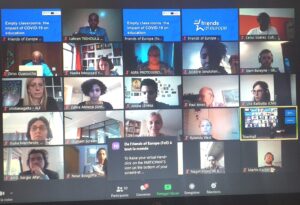
Ensuring that all girls and boys are granted quality education is a prime ambition of the Sustainable Development Goals*. The return is considerable: a more diverse and prosperous economy, access to better services, and increased equality are amongst the clear benefits from open access to free education. The path towards achieving SDG4 is also an opportunity to develop the potential for collaboration between countries. Over the last few decades, exchange programs across Europe and its neighboring countries have been developed to enable a greater spread and diversity of knowledge. In the Euro-Mediterranean region, exchange programs such as Erasmus+ and virtual platforms including Erasmus+ Virtual Exchange have encouraged decision makers and academics to work together in sharing knowledge and best-practices, while equally enabling youth to discover new cultural realities and gain intercultural learning.

However, COVID-19, having kept 90% of all students out of school, the important progress of recent years is at severe risk of being reversed. With many classrooms remaining empty for several months, authorities have scrambled to develop alternative education systems to connect teachers and students. The results vary greatly, with striking differences in completion rates between richer and poorer households, further exacerbating inequality.
- What role can digital tools play to provide uninterrupted quality education for all and intercultural experiences to students?
- Which strategy should be adopted by international partners?
- How can lessons from this pandemic make our education systems more resilient and inclusive?
These concerns were raised by the online debate organised at the end of September 2020 by Friends of Europe, with main speakers: Elisabeth Guigou, President of the Anna Lindh Foundation and former Minister of France, and Driss Ouaouicha, Deputy Minister for Higher Education and Scientific Research of Morocco.
Educational organisations from the Euro-Mediterranean region, such as Fotoessa, participated in the debate on the impact of the pandemic on education. Colleagues from every level of education and training, from different countries, gave their own testimony of the situation in formal and non-formal education from the restrictions imposed by anti-pandemic measures. Through the discussion, some common conclusions were drawn, such as:
- Despite the technological resources offered by digital education, teaching and learning in the same physical space remains irreplaceable. Moreover, in cases where such teaching is feasible and intensive – particularly in more affluent societies – fatigue, distancing and indifference, especially among children and young students, has already been apparent.
- Compulsory online teaching has increased social inequality between social groups, in particular between people who can access it and those who do not have an internet connection, computer, etc. Many colleagues stressed the need to disseminate basic digital education instruments to each social group, particularly the most vulnerable and geographically isolated.
- The positive parameters of digital communication and education have been based on the possibility given by digital means for horizontal communication without frontiers, for the immediate exchange of experiences, opinions and proposals, in real time, in a safe environment, without the need and cost of travel.
The discussion was organised in collaboration with the Anna Lindh Foundation with the support of the EU. You can follow the entire discussion at:
https://www.youtube.com/watch?v=RdOjsXCxKYo
* On 25th September 2015, the 193 countries of the UN General Assembly adopted the 2030 Development Agenda titled ‘Transforming our world: the 2030 Agenda for Sustainable Development’. This agenda includes the Sustainable Development Goals (SDGs), 17 priority goals that cover many important issues for the world.
